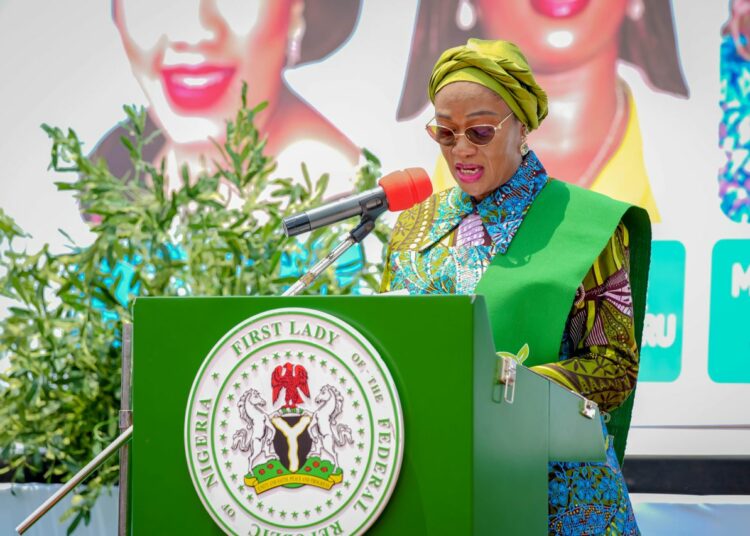Nigeria’s first lady, Senator Oluremi Tinubu, has expressed worry over the non-inclusion of women, who are still struggling to get their place in politics and governance because of unfriendly policies that disadvantaged them.
Mrs Tinubu raised the concern at the ‘International Legislative Dialogue on Women and Constitution Amendment in Nigeria’ organised by the House of Representatives Committee on Constitution Amendment in collaboration with the Policy and Legal Advocacy Center (PLAC) and European Union (EU), held in Abuja yesterday.
Represented by the Kwara State first lady and chairperson of the Nigeria Governors Spouses Forum, Prof. Olufolake Abdulrazaq, the president’s wife, she admitted that some gains had been made over the years.
However, she said it was disheartening that only a few women were elected to the two chambers of the National Assembly at the 2023 general election.
According to the Senator, though women contributed immensely to the electoral process, their participation was curtailed as they were denied equal opportunities in governance and politics.
Senator Tinubu said less progress had been made in achieving a sustainable process to fast-track women’s participation through wider policies for the girl child and educated, intelligent, and potential women leaders in the country.
She stressed the need to address barriers such as socio-cultural inhibitions limiting national growth through the non-inclusivity of women in politics and governance.
The former female lawmaker emphasised the need for more gender-responsive policies and legislation to boost women’s participation and affirmative initiatives.
In his keynote address, Speaker Abbas Tajudeen emphasised the importance of empowering women, noting that it is a necessary, strategic move for economic growth.
The speaker said it was disheartening that females were low in numbers at the 10th National Assembly.
“The current numbers are disheartening. Since 1999, women’s representation in our National Assembly has remained disappointingly low. Despite notable contributions from Nigerian women across various sectors, only 20 of the 469 seats in our National Assembly are occupied by women. This stark gap speaks not of a lack of capable women but of institutional barriers we must dismantle.
“Today represents a meaningful step forward in our collective commitment to inclusive governance and national progress,” Speaker Abbas stated while noting that the dialogue was “not for rhetoric but to establish a clear and actionable path toward meaningful reform.
“Our goal is to ensure that Nigerian women, an essential part of our nation’s social and economic fabric, secure their rightful place within our governance framework. Empowering women is not only a moral and democratic imperative but also a strategic economic necessity.”
On his part, the deputy speaker, Benjamin Kalu advocated the removal of barriers that hinder women’s political advancement in Nigeria.
He said giving women opportunities to participate in parliamentary activities and governance processes will not only birth a legislature that reflects the diverse makeup of Nigerian citizens and values but also bring immense benefits to general society.
Kalu, who is also the Chairman of the House Committee on Constitution Review, lamented the low number of women fielded as candidates in the last 2023 general elections.
The deputy speaker called for support for the gender bills that were before the parliament to ensure that women are given an opportunity to make their contributions to the country’s political development.
He said: “I am honoured to lead the House Committee on Constitution Review, where we have
proposed bills aimed at correcting the gender imbalance within government at all levels.
“One such critical bill, “A Bill for an Act to Alter the Provisions of the Constitution of the Federal Republic of Nigeria, 1999 to Provide for Seat Reservation for Women in the National and State Houses of Assembly” (HB 1349), alongside four other gender justice bills, are under consideration.
“This proposed legislation is designed to remedy the low representation of women by creating additional seats specifically for female candidates in national and state legislatures. These reserved seats are not a permanent fix but are structured as a temporary special measure, subject to review after four general election cycles or 16 years.”
On her part, Zissimos Vergos, Deputy Ambassador of the EU Delegation to Nigeria and ECOWAS, underscored the importance of women’s representation in governance as both a fundamental right and a driver of inclusive growth.
“The active participation of women at all levels of decision-making and politics is essential to the achievement of equality, sustainable development, peace, and democracy.
“Women’s equal participation in power and decision-making roles is part of their fundamental right to participate in political life and sits at the core of gender equality and women’s empowerment,” she added.





